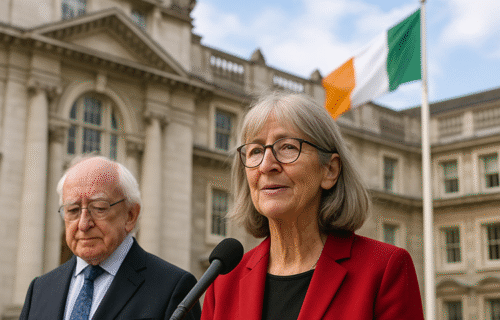Ireland has elected independent lawmaker Catherine Connolly as its next president, marking a decisive moment in the country’s political landscape. Early results showed Connolly taking a commanding lead that prompted her main rival, Heather Humphreys of Fine Gael, to concede even before counting was complete.
Connolly, 68, a Galway-based barrister and veteran parliamentarian, ran as an independent but drew broad support from across Ireland’s left-leaning parties, including Sinn Féin, Labour, the Greens and the Social Democrats. Her victory, with roughly two-thirds of first-preference votes, reflects a shift in voter sentiment toward candidates promising a more inclusive and socially focused presidency.
While the office of president in Ireland carries limited executive powers, Connolly’s campaign resonated beyond its ceremonial boundaries. She pledged to act as a moral and civic voice for equality, housing reform and peace, themes that appealed strongly to younger voters and those frustrated with the country’s rising living costs.
Connolly’s background as a critic of global militarisation and her calls for a more socially oriented European Union have distinguished her within Ireland’s political establishment. She has also spoken out on humanitarian issues, including the conflict in Gaza, and has argued that Ireland’s neutrality should remain central to its foreign policy. Her opponent, Heather Humphreys, who serves as Minister for Social Protection, congratulated Connolly shortly after tallies confirmed the scale of her lead, saying that she would be “a president for everyone.”
Turnout was just under half of registered voters, one of the lowest in Ireland’s presidential history, though analysts noted that the result still delivered a clear mandate. Outgoing President Michael D. Higgins, who has served two terms since 2011, is expected to formally hand over office in mid-November at Áras an Uachtaráin, the presidential residence in Dublin’s Phoenix Park.
Connolly’s election is widely seen as a symbolic endorsement of change rather than a transformation of Ireland’s political structure. The president’s responsibilities are largely constitutional—representing the state abroad, signing bills into law, and acting as guardian of the republic’s democratic traditions—yet the choice of who occupies the office often reflects the national mood.
Connolly’s presidency is unlikely to alter the mechanics of Ireland’s foreign or defence policy, which remain firmly under government control. However, her public positions could subtly influence how Ireland’s neutrality is articulated on the European stage. During her campaign, she emphasised the importance of diplomacy over deterrence and called for a stronger focus on humanitarian priorities within the EU’s foreign policy framework. Observers in Brussels and Dublin expect her to maintain Ireland’s pro-EU stance while giving greater visibility to debates over military spending, social justice and peacebuilding—issues she has championed throughout her parliamentary career. Analysts suggest that Connolly’s symbolic leadership could lend momentum to those in Europe advocating a “civilian power” approach rather than deeper defence integration.
At the same time, officials note that Ireland’s presidency of the European Council in 2026 will fall entirely under government direction, with the president serving a representative and ceremonial role. Connolly’s challenge, therefore, will be to project moral authority without overstepping constitutional limits—a balance that her predecessor Michael D. Higgins managed with notable success. Her election also arrives at a time when Europe’s geopolitical environment is shifting rapidly, and questions about NATO cooperation, EU defence autonomy and neutrality are being revisited across the continent. In that context, Connolly’s presidency may serve as a reminder that Ireland remains one of the few EU members committed to a non-aligned identity, even as it deepens practical cooperation with its European partners.
Analysts say her landslide victory signals public appetite for a more independent and socially conscious tone in Irish politics, even if her formal powers remain limited. As one Dublin political observer put it, the presidency is where Ireland expresses its conscience, and this result shows that conscience has shifted.
Connolly’s success also mirrors a wider European pattern in which voters are turning toward candidates seen as outside traditional party hierarchies. Across the continent—from independent mayors in Central Europe to civic and green movements in Scandinavia—electorates are rewarding figures who embody integrity, authenticity and social balance rather than strict party loyalty. Her win reinforces the sense that symbolic offices, once viewed as apolitical, are becoming arenas where citizens express their expectations for a fairer and more accountable Europe.
Editorial Disclaimer: This article is for informational and analytical purposes only. CIJ.World maintains strict editorial neutrality and verifies all facts at the time of publication.
